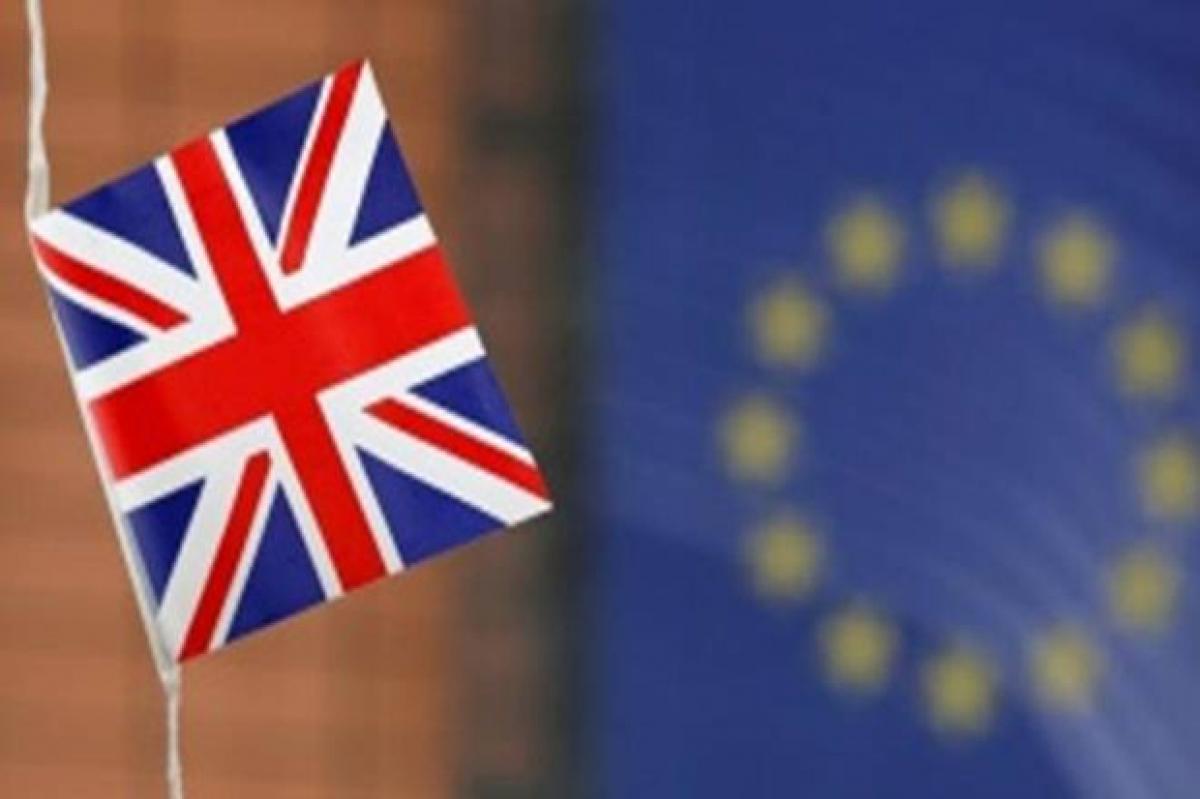Live
- NASA Tracks Five Giant Asteroids on Close Approach to Earth Today
- Pushpa 2 Hits ₹1000 Crore in 6 Days: How It Compares to Other Top Indian Films
- Vivo X200 and X200 Pro Launched in India: Price, Specifications, and Features
- Nitin Gadkari Admits Feeling Embarrassed at Global Summits Over Rising Road Accidents in India
- Comprehensive Review on Indiramma Housing Survey and Welfare Initiatives Conducted via Video Conference
- Jogulamba Temple Records Rs 1.06 Crore Hundi Revenue in 150 Days
- Opposition Slams ‘One Nation, One Election’ Bill as Anti-Democratic; BJP Allies Support the Move
- Celebrate Karthigai Maha Deepam Virtually with Sri Mandir’s LIVE Darshan Experience
- BJP Extends Support to Samagra Shiksha Abhiyan Employees' Strike, Demands Immediate Regularization and Welfare Benefits
- Dr. M. Priyanka Stresses Quality Education, Nutritious Meals, and Cleanliness in Schools
Just In

Clarity on Britain\'s plans to exit the European Union (Brexit), along with the progress of monsoon rains and derivatives expiry are expected to steer the Indian equity markets in the upcoming week.
Clarity on Britain's plans to exit the European Union (Brexit), along with the progress of monsoon rains and derivatives expiry are expected to steer the Indian equity markets in the upcoming week.
Other major risks like a weak rupee, low foreign fund inflows and global uncertainty brought about by Brexit are expected to linger on during the week starting June 27.
Besides, investors are expected to keep an eye out on the Indian companies and sectors that have a high exposure to Europe and the UK such as the automobile, pharma and IT industries.
Nevertheless, positive outcomes such as value buying, short covering, lower global crude oil prices and expectations on future stimulus measures by international central banks can perk up sentiments.
"It’s important to understand how the global central banks and policy makers react- infusion of liquidity, rate cuts and the like. That support could for the time being stabilise the markets," Devendra Nevgi, Chief Executive of ZyFin Advisors, told IANS.
"We also need to watch the FPIs (foreign portfolio investors) flows in response to Brexit."
As per provisional figures from the stock exchanges, the foreign institutional investors (FIIs) divested stocks worth Rs 641.17 crore during the week ended June 24.
The National Securities Depository (NSDL) figures showed that FPIs were net sellers of equities worth Rs 4,776.43 crore, or $708.77 million from June 20-24.
In 2016, the equity segment had noted a net portfolio inflow of $2.8 billion, while debt outflows stood at $1.1 billion.
However, market insiders cited that the government's latest move to liberalise foreign direct investment (FDI) regime in several sectors will help to attract foreign funds.
"Improved macroeconomic fundamentals and recent economic announcements on major economic policy initiatives by the Modi government are expected to attract the foreign funds," D.K. Aggarwal, Chairman and Managing Director, SMC Investments and Advisors, told IANS.
"Going forward, stock markets will track global peers. Besides, market cues are likely to depend on progress of monsoon, movement of rupee, foreign fund inflow and fluctuating global oil prices."
Apart from Brexit, global industrial output and inflation figures are also expected to be focused upon.
"We are likely to see continued ripple effects of the EU event. To this end, German CPI (consumer price index) as well as manufacturing PMI (purchasing managers index) could be in focus," Anand James, Chief Market Strategist at Geojit BNP Paribas Financial Services, told IANS.
"With Nikkei also plummeting almost as hard as the European indices, Japan’s IIP (index of industrial production) and CPI figures scheduled next week will also be in the radar."
Domestically, the Indian investors would look out for any news on the progress of the monsoon, as well as the details of the Rs 6,000 crore textile policy announced last week.
"F&O (futures and options) expiry falls on June 30, when eight core activity figures will also be released, while the manufacturing PMI would also be out on July 1," James said.
On the rupee's front, James explained that the RBI (Reserve Bank of India) assurance to contain volatility has kept further weakness on check.
On Friday, the Indian rupee weakened by 71 paise to 67.96-97 against a US dollar from its previous close of 67.25-26 to a greenback. It had dived over 1.4 per cent to an intra-day low of 68.22 to a US dollar.
On a weekly basis, the currency fell by 88 paise to 67.96-97 against a US dollar from its previous close of 67.09 to a greenback.
According to Dhruv Desai, Director and Chief Operating Officer of Tradebulls, investors will closely follow the progress of the monsoon.
"Investors will closely follow the important cues in the next two-three weeks would be the global market reaction on Brexit, monsoon progress and the foreign debt data going to public next week," Desai told IANS.
Last week, the IMD (India Meteorological Department) had said that rains were seven percentage below average in the week ended June 22. However, monsoon's entry into north and central India gave hope of a normal rainy season ahead.
Further, stock specific action can be expected in sectors like of consumer durables, consumer non-durables and automobile industries which are most impacted by a good monsoon.
The equity markets were dented last week, as Britain voted to exit the EU, which cascaded into a sharp drop in the rupee's value and dried up foreign fund inflows.
The 30-scrip sensitive index (Sensex) of the BSE plunged by 286.37 points or 1.07 per cent at 26,367 points, whereas the 51-scrip Nifty of the National Stock Exchange (NSE) lost 81.6 points or 0.99 per cent at 8,088.60 points.

© 2024 Hyderabad Media House Limited/The Hans India. All rights reserved. Powered by hocalwire.com







